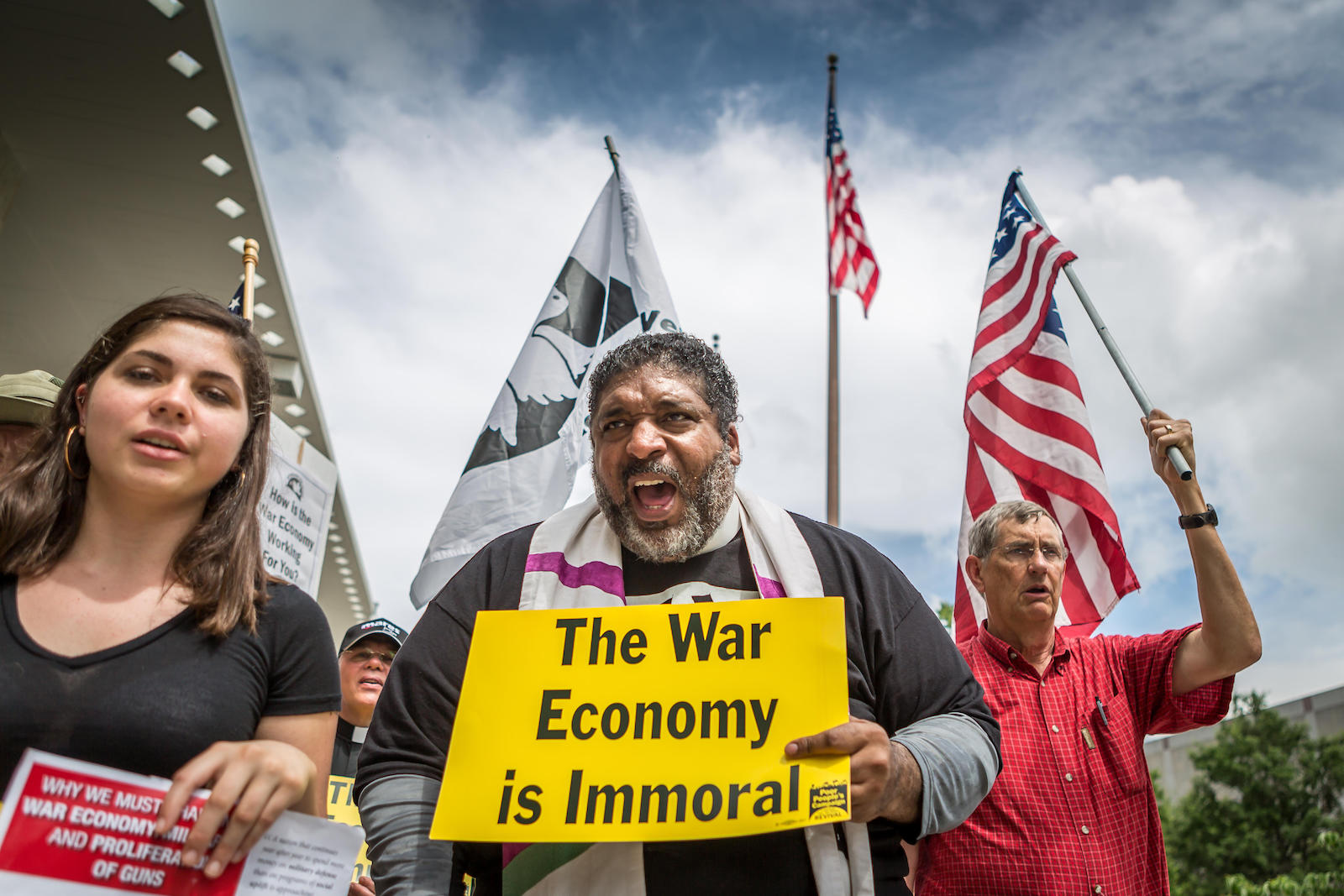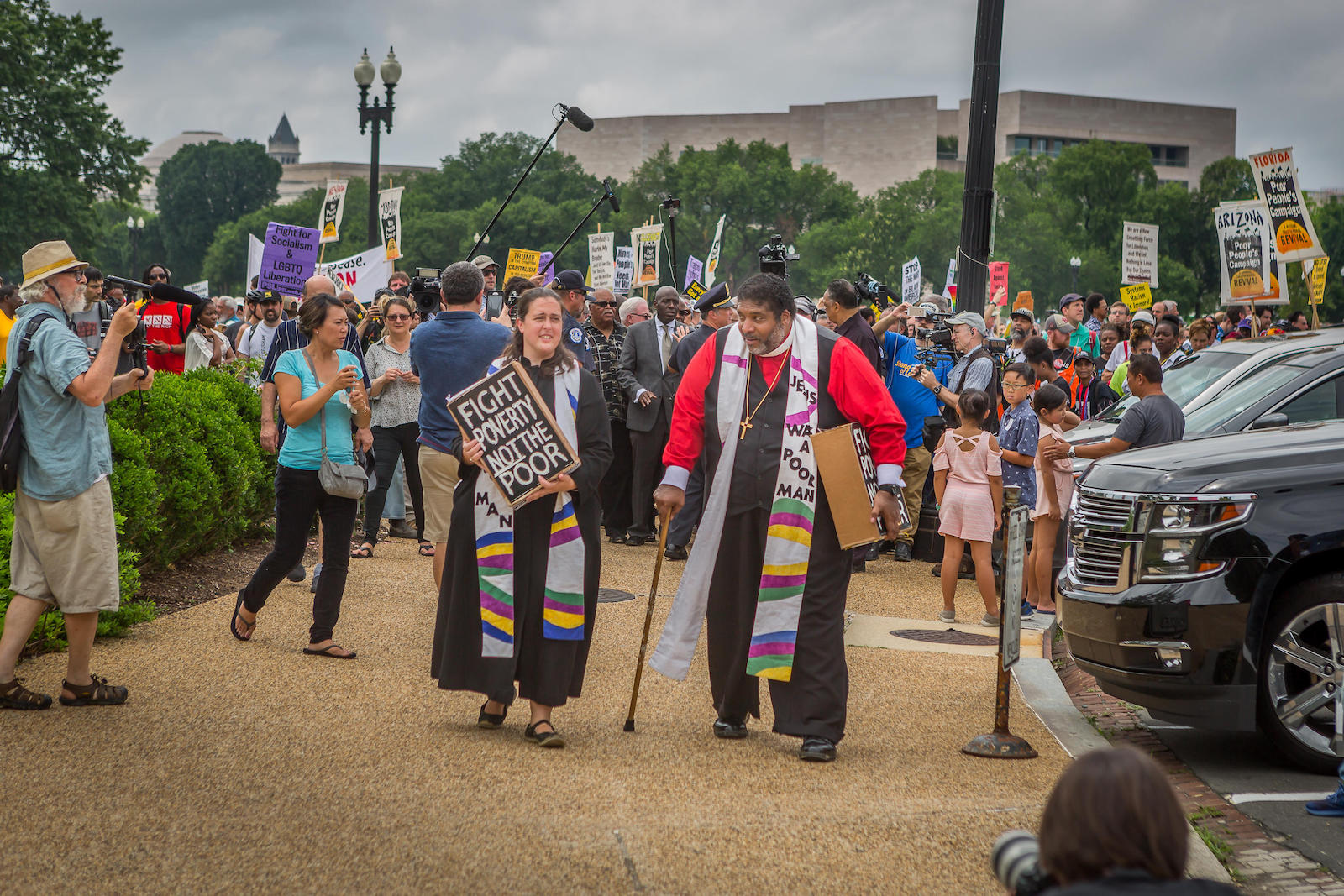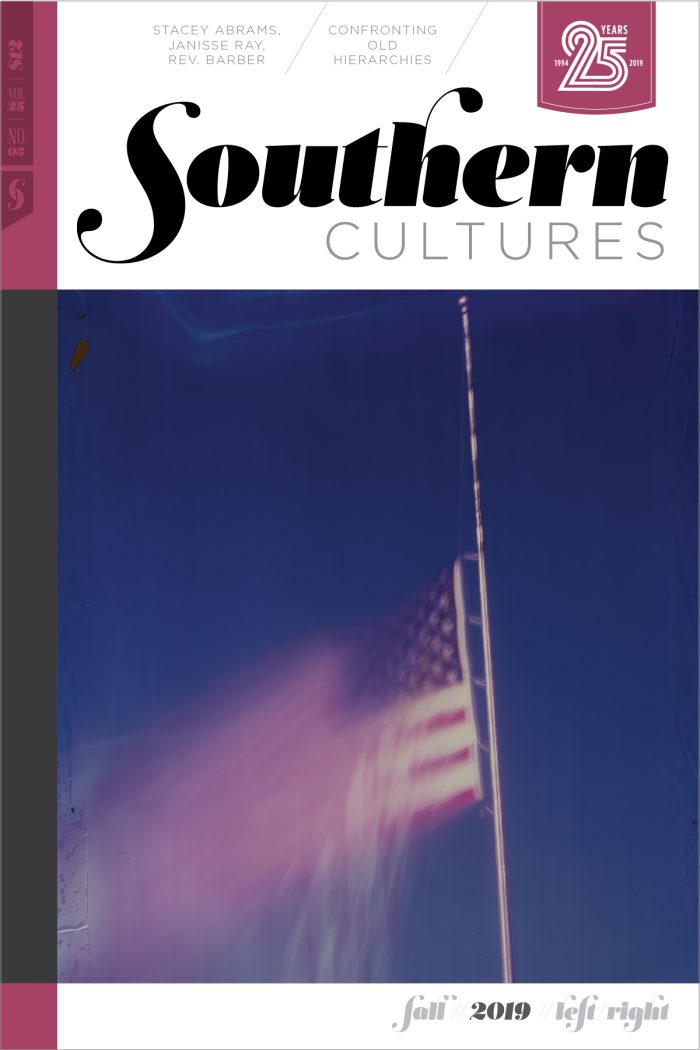REV. DR. WILLIAM J. BARBER II: My father . . . said, “When you feel overwhelmed by your moment, go back and read the moments that people faced that are worse than yours. What courage and hope and truth did they find in that moment?” I go back and I read Henry McNeal Turner and read what Fredrick Douglass was saying. I love to read. That’s the stuff that gets me going and it helps because it keeps you from . . . doing what I see so many people doing today, which bothers me, they say, “We’ve never seen anything like this.”
Theologically, I was taught . . . a phrase: “Is it worse than Calvary?” And that is not to suggest it isn’t bad. It’s just to acknowledge, you’re not the first one. It may not be the worst day—this has happened in history and other folk have somehow come through it. So gird up, get up, and grow up.
I read a lot about Martin, and what intrigued me . . . I was never taught to just throw people away; never taught to say, “This person has nothing to say,” or they were this. I was never taught to accept [that] the one way some people see things is the only way, like, “Malcolm was the evil King” was [OK]. Now, that kind of false history, this is not history at all. But what I was taught to do is read and listen for the humanity of all people.
Maybe now we say [Malcolm] made some mistakes but, man, he was growing. This kid, twenty-something years old, and America kills him. I mean, the system murders him. I’m three years, two years old, when he’s murdered in ’65. We don’t know what Malcolm would’ve become. We do know, even with what he had, he could hold his own, whether he was on Face the Nation or at Harvard.
TIM TYSON: That’s right. Oxford, England.
WB: England. We knew that. And we knew he had this experience, and we knew that if you listen in some ways, you see him coming toward King, with King coming toward him in some way—
TT: King is often misunderstood anyway—
WB: Very much so.
TT: They act like King said, “Light a candle and sing a song and walk out in the rain.”
WB: And sing, “Kumbaya, everything gonna be all right.”
TT: Hell no.
WB: America, you need a dream because there’s this nightmare. You need something to reach for and we’re going back into the nightmare with this hope. I think I’ve tried to learn from all of the various perspectives and that’s what I was taught by my father’s model and my father’s ministry and my father’s method, that you just didn’t just write people off, whether it’s in society or in scholarship; you try to have some sense of learning from, even sometimes from the worst ones. He would often ask me, I know you don’t like this person, but what are they doing? How did they get such a hearing in society? What techniques does he . . . I’m not saying you use the technique, I’m just saying what is it? And I hope that’s part of what this moral movement is about.
America, you need a dream because there’s this nightmare. You need something to reach for and we’re going back into the nightmare with this hope.
TT: So when was it that you decided that you needed to run that demonstration campaign that became known as Moral Monday?
WB: I told this story in my book The Third Reconstruction; when extremists saw a Black, white, and brown coalition vote for Obama in 2008, they invested everything they had in taking all three branches of state government. By the 2012 election, they had total control. I knew after the first fifty days of the legislative session in 2013, after all the regressive stuff they did and when they passed the voter suppression bill right before they went home for Easter, we had to do something. This was the backlash before Trump. It was the week before Maundy Thursday, it was during that week. I just knew in my mind, these folks were determined to crucify everybody. And the one thing I knew from a metaphorical perspective is that every crucifixion has to have a witness. And witnesses have to witness. It may not be a lot but somebody has to name it for what it is. And they weren’t going to get better. They were going to get worse. But our response could not be going home and allowing that to happen in the dark, because we needed something that would keep it exposed before the people and keep the people moved, motivated, and angry enough.
TT: I remember the way I felt and what I observed was that, at first, the tableau was not as good. We learned you really need to beef up the tableau so that there’s no way they can take the picture and make it, you know—
WB: Oh yeah. We made that decision early on that nobody would stand on that stage by themselves, that . . . from our stage would always be a scholar, a moral leader, and an impacted person, which is what we’ve brought even over to the Poor People’s Campaign. [And] that the stage would always have a backdrop, and that backdrop would always be diverse.
That was one of the critical things about this movement: it also taught in public that you do not build a stage for any one person to stand on. And that every time we moved, you will not find a historical picture of Moral Monday or HKonJ [Historic Thousands on Jones Street] where I’m standing out . . . speaking for the people without being with the people.
People don’t want you to tell them what to do. We’re not talking about telling people. We’re talking about messaging because the people that we are fighting against and fighting hopefully to change, they are good at messaging. And disciplined message. The trumpet can’t give an uncertain sound, the scriptures say.
People don’t want you to tell them what to do. We’re not talking about telling people. We’re talking about messaging.

TT: Let me ask you about language. One of the things that I noted early on is we started this movement, it was growing, and there was a lot of Jesus, Jesus, Jesus. In the name of Jesus. It was very . . . And often a very gendered male language. And actually, you were the least of the offenders but—
WB: But I did it, too.
TT: Your language did change.
WB: We were building a moral movement on our deepest moral and religious values, and claiming them all. And we were building a movement where people would come in through their moral leanings of the constitution, who may not believe in any faith at all. And so it was not necessary, and it would be foolish, to limit the language because of some claim that I’m giving up my faith. People know I’m a Christian minister. That’s why it’s important for me to welcome everybody, because part of my faith says I’m to become all things to all people. Part of my faith says I’m to be open and loving. Part of my understanding of the constitution is it’s all people. I can’t be tribalistic and fight tribalism. I just can’t do that.
And so I grew with my language. We grew in the language of not always saying “He.” That’s important. We grew in the language of welcoming all people. We grew in the language of saying red and yellow and Black and brown and gay and straight and young and old, and claiming everybody . . .
And also we taught people who came to me and said, “No, I don’t want any of that religion because I’m an atheist.” We had to say, “No, now, we’re not going to knock you because you’re not personally religious, but then you can’t push other folk out. Why don’t we just find and learn how to speak to each other, how to have this language that holds onto our identities but is not idolatrous in the sense that we worship our language to the dismissal and the denial of other people?” So what would be funny was for me to hear atheists start saying, “Amen.”
TT: Oh my!
WB: There’d be an Amen. And so in the Moral Monday Movement, there was a spirit of love, a spirit of justice, a spirit of commitment, a spirit of caring. And people were finding themselves in spaces they had never thought they would be in together. And to be a part of that and to help serve that and to lead that has been a marvelous learning experience for me but also a privilege. To be in airports now, people will just come up and say . . . “You know I’m an atheist but I kind of like the Jesus you talked about.” Or for a Muslim to say, “But you’re my brother.” Or for a Jewish person.
Or because of the work at Moral Monday, the places I’m able to go now. Like, for instance, a few weeks ago we did a Jewish Seder in a Mosque in Philadelphia and I preached, and the Muslims gave up part of their prayer time and their prayer rug, and the Jews gave up wine. And some of the Jewish women put on the hijabs. And they invited me, and the first thing, they introduced me as the leader of Moral Monday, a multiracial, multi-religious movement that learned how to do that. Now, of course, they had all this security because for some reason when people do that, people want to kill you. And I got to meet Rabbi Arthur Waskow, who’s one of the renowned rabbis like Rabbi Heschel in King’s day. And he was with Heschel and King, and he’s still alive. And he called me and asked me, “I need you to do this.” He says, “The first time in history that we’ve had a Jewish Seder, a justice Seder, in a Mosque.”
TT: Who would have thought you’d have—
WB: See what I’m saying? And in the middle of it, the Muslim crier comes up and leads us to prayer. And then a female rabbi chants Jeremiah 22: “Go down to the King’s house and tell them.” And then I preached that night and get so caught up that I end up just, out of the spirit, announcing we needed to march on the White House and deliver the Moral report—this is before there was even a Mueller report or anything. And then we end up having two blocks of clergy—a few weeks prior to this interview—march on the White House and deliver a moral indictment and moral impeachment. And you’ve got all these folks, Hindus, Muslims, Christians.
But all of the group, the ability to even stand in that place, grew out of 2007, 2006, meeting at Greenleaf Christian Church, 2007, HKonJ, all the way up through there—the movement, the learning, the teaching—right on through Moral Monday, right on through the lawsuits, right on through the victories in 2016 with the lawsuits and the voter registration. All of that is actually the fertile ground, if you will, for now—being able to stand in all of these different places with credibility. I mean, I went to Alaska and the folks knew about Moral Monday. The natives. I’m going down to Mississippi, I’m going up to Binghamton, New York. They know about it. Ohio, Indiana.
The Apache Nation knew about it. They said, “We want you to come out because we heard about this movement called Moral Monday and this forward together moral movement, and we think there’s some lessons here for us coming together.”
TT: We all learned how to connect practically any issue to any other issue.
WB: Any other issue. That’s exactly right.
TT: You know, women are not protesting for women’s rights just because they want to have their lifestyle or something.
WB: Right.
TT: They don’t want little girls growing up stunted and with a small vision of themselves. That’s love.
WB: That’s love.
TT: The environmentalists don’t just want to go canoeing on the Dan River and you’ve messed up their little trip. They don’t want the children down the river to be poisoned, and that’s love.
WB: To be poisoned, to die, to be stunted. And they recognize that the same people that many times would stunt them educationally would stunt them environmentally. The same people that would stunt them financially. So if they are all the same people, then why not all of us who are being targeted return the favor? And not just return the favor for their destruction, but perhaps if we can show this country and these states the broad picture and the face of all who you are hurting, it will have some impact of shifting consciousness even amongst some people who may have been “agin us,” as grandmamma say. Agin us. I want to win. I want to beat some of this stuff. I don’t want racism to keep dividing us.
Perhaps if we can show this country and these states the broad picture and the face of all who you are hurting, it will have some impact of shifting consciousness even amongst some people who may have been “agin us,” as grandmamma say.

TT: We’ve been losing that way. Why keep going?
WB: Right. And I can’t talk to enough white people to make a difference. I don’t want white people not to understand the interconnectedness to their lives, to what racism has done to hurt them, because I’m tired of the divisions in the South. I’m tired of Dr. King telling us, ’65, what was being used against us, and we’re still allowing it to be used against us. I’m tired of seeing faith hijacked in the public square and used as a weapon of hate. I’m tired of it.
I’m tired of the divisions in the South. I’m tired of Dr. King telling us, ’65, what was being used against us, and we’re still allowing it to be used against us. I’m tired of seeing faith hijacked in the public square and used as a weapon of hate. I’m tired of it.
TT: Something seems to have changed. When the wind is blowing, politicians ain’t nothing but a cork bobbing on the surface . . .
WB: That’s all. The current is what makes that cork—not the fish that’s biting, the current.
So I’m joyful. I’m sad that it has to take all this because it says something that’s so flawed about our humanity that we would see a politics that basically ignores 43 percent of the nation who are poor and is simply doing incremental things rather than a full-fledged policy push to address it. And I’m certainly sad to see the way in which religion has been used in the support of policies that would hurt the poor and low wealth.
But I’m overjoyed to see this movement. I’m overjoyed to see all the clergy that are coming out, all the people that are coming out, all the impact of the people that are signing—that we are with them, not for them.
And the last thing, I’m more committed because if we can see the things we’re seeing now with the work we have done to this point, what are we going to say with the work that we’ve got planned?
And to be quite honest—not proud to say this—the last piece, I too worried about getting out there and the threats don’t get easier. But one of the things I love about this movement and the way we’re trying to build it is that we’ve tried to build it in such a way that they can’t hurt us all. And that’s what’s so powerful about it. When California had a twenty-one-day Poor People’s Campaign bus tour with media embedded, guess who wasn’t on the bus? Me or [other movement leaders]. They did that. These state bodies, we’ve trained them to do what we did here with Moral Monday. And that’s what’s power. They are moving interdependently but with a strength and a power that you can’t stop. You couldn’t undo these forty-one groups now if you wanted to.
This interview appeared in the “Left/Right” Issue (vol. 25, no. 2: Fall 2019) and has been edited and condensed for publication.
Rev. Dr. William J. Barber II is a pastor and activist, and founder of the influential Moral Mondays movement for civil rights in Raleigh, North Carolina.
Tim Tyson is a historian at Duke University and an activist involved in the Moral Mondays movement. His most recent book is titled The Blood of Emmett Till (2017).
Header image: March in Washington, DC, June 23, 2018. Michael Nigro/Pacific Press/Alamy Live News.


